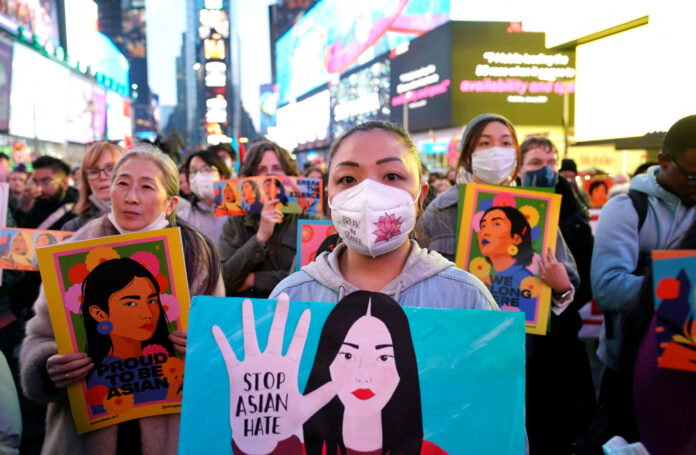Asian American hate is on the rise. And it is no accident that xenophobic pandemic conspiracies contributed to nearly 75 percent of Chinese Americans experiencing racial discrimination and hate in the past year. To date, almost half the country believes China purposefully released SARS-CoV-2, despite no scientific consensus as to whether SARS-CoV-2 emerged naturally or leaked accidentally from a lab. In fact, both the U.S. Department of Energy and the FBI weakly concluded—with “low confidence” and “moderate confidence,” respectively—that the virus leaked from a lab in Wuhan, China. And four other federal agencies have either declined to conclude or outright rejected the Wuhan lab leak hypothesis.
Against this backdrop, so many—especially Republican members of Congress—still peddle a certain narrative that China deliberately spread the virus, despite no scientificevidence that the virus was purposefully engineered in a Wuhan lab.
As concerning as it is that so many Americans—and our elected officials—continue to believe China unleashed the COVID-19 pandemic, it is unsurprising, particularly given our country’s long and sordid history of xenophobia and racism toward those of Chinese descent. The first major federal law restricting immigration into the United States singled out Chinese immigrants specifically bybanning Chinese workers from coming to the U.S. Subsequent immigration laws set stricter limits on the number of Chinese immigrants who could be admitted into the country.
History repeated itself when the COVID-19 pandemic began. China, once again, was the first country targeted by U.S. travel restrictions. On Jan. 31, 2020, the Trump administration announced a nationwide ban on travel from China, which applied only to non-U.S. citizens, even though facts showed the first epidemic wave in New York originated from Europe. As experts noted at the time, the ban on travel from China made little sense. It was a policy shaped by xenophobia rather than solid epidemiological evidence. As a result, Donald Trump’s travel ban did not mitigate the spread of COVID-19 but exacerbated the spread of xenophobia and anti-Asian racism.
Consider, for instance, a report by the California Department of Justice in 2020 that found, in California, the number of anti-Asian hate crimes reported increased by 107 percent in 2020, and then worsened another five-fold in San Francisco in 2021. Another report analyzed data from 16 of the largest cities in the U.S. in 2020, and found that, while overall hate crimes declined by 7 percent, hate crimes targeting Asian people increased by 149 percent.
Yet there were never calls by former President Donald Trump or the majority of Republicans in Congress to ban European travel. For his part, Donald Trump added further fuel to the racist fire by referring to COVID-19 as the “China virus” and “Kung Flu.” The Daily Mail circulated a video of a Chinese social media influencer eating bat soup in 2016. Ignoring both the date and location of the video, people pointed to the viral video as evidence that Chinese culinary habits were to blame for the emergence of the virus during the pandemic.
Importantly, the racist and xenophobic lens through which many Americans and elected officials viewed the COVID-19 pandemic also skewed efforts to trace and understand the early spread of the virus. While U.S. politicians and scientists were quick to demand an investigation into the spread of SARS-CoV-2 in China, little attention was paid to the fact that SARS-CoV-2 was circulating in multiple regions of Italy in December 2019, or to a retroactive analysis that found a patient in France also had SARS-CoV-2 in December 2019. Despite these findings published in 2021 and 2020, respectively, we have yet to see a U.S. politician publicly demand an investigation into the early spread of COVID-19 in Western Europe.
TIMOTHY A. CLARY/AFP via Getty Images
Now, more than three years later, Americans’ understanding of COVID-19 continues to be distorted by xenophobia and often divorced from scientific evidence.
Worse, the racist misinformation and disinformation that nearly half of Americans somehow now hold, believing China released SARS-CoV-2 on purpose, has serious implications for U.S.-China relations and for the overall attitudes that Americans have toward Chinese Americans in the United States. Allowing misinformation to fester only emboldens xenophobes and foments anti-Asian American racism and violence.
During Asian American Pacific Islander Heritage Month, we celebrate the contributions that our community has made and continues to make in this country. However, we also understand that there is much work to be done in eradicating Asian American hate. And doing so requires every elected official to be honest about the long struggles of Asian Americans and finally set the record straight about COVID-19.
The longer elected officials wait, the more we fear racially motivated violence in the months and years to come. Every elected official must speak out before it is too late.
Dr. Eric Feigl-Ding, Sc.D., is a Chinese American epidemiologist who was among the earliest to warn about COVID-19 becoming a deadly pandemic. He is the chief of the COVID Task Force and faculty at the New England Complex System Institute, co-founder of the World Health Network, and serves on the WHO’s COVID-19 Mortality Committee.
Yuh-Line Niou is a Taiwanese American civil rights advocate, and was the first Asian American to represent Chinatown in the New York State Assembly.
Victor Shi is a Gen-Z activist, student at UCLA, host of On the Move with Victor Shi, and co-host of the iGen Politics podcast. Previously, he was elected as the youngest delegate for Joe Biden and has worked on national, state, and local campaigns.
The views expressed in this article are the writers’ own.


